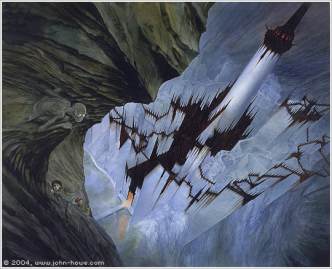Disclaimer: the nature of evil and the way we interpret it is inherently combined with the worldview of the reader. That means that I cannot effectively discuss the depiction of evil in LotR without addressing how my religious upbringing interacted with my ideas of evil in the world. I try to avoid such religious criticism when I can, but it is essential in this post. Feel free to skip to the next post if you are uninterested in this type of commentary.

Since I read LotR as a kid, Sauron was a very effective depiction of evil to me. He was a disembodied, vague figurehead who inspired malice in his followers and crushed or corrupted his enemies. He was able to achieve all of this without ever being seen.
This type of pervasiveness made Sauron seem very complex to me as a child. I had a hard time understanding critiques of evil in LotR as being simplistic or naive. How could it be simplistic if it is able to be so pervasive and influential? To me, raised as a Sothern Baptist, Sauron was an accurate depiction of Satan (not the figure, but the figurehead). I did not understand that what people took issue with was the monolithic appearance of evil. As I think back, my lack of understanding is not very surprising to me.
Now we get to things hard to express in writing, especially plain writing without metaphor: As a child, evil was simple to me. Satan was simple to me. It was anything or anyone who caused pain or disagreed with someone I loved. This included those little thoughts of rebellion inside my own mind. Those things which were labeled as evil were to be avoided instantly. As a child, I did not wait to make distinctions or to problematize the character of evil, I fled it. Therefore, Sauron appeared as complex to me as any other evil, because all evil was monolithic.
To contradict myself, channeling my inner Walt Whitman, just because evil seemed simple does not mean that it was easy to defeat or avoid. The way that Tolkien portrays the Ring made sense to me as a Christian. I saw it as an embodiment of temptation. This is how Boromir was corrupted by it, and why each new character was to be mistrusted. Anyone at any time could feel the pull of the Ring and become ‘evil.’
To try to sum up what I have meant to express here: as a child evil was easy to identify, but impossible to avoid entirely. Sauron was a perfect embodiment of this kind of evil, which overlapped with my understanding of Satan from the Christian tradition. This meant that Sauron was, to me, the most effective antagonist I had ever encountered.
Where Do We Go From Here?
To examine Aragorn as a king, and then to start the homeward journey!
What Do You Think?
How did Tolkien’s depiction of Sauron interact with your view of evil?
How did you understand the Ring’s pull on other characters?
Did I miss anything? Let me know!





